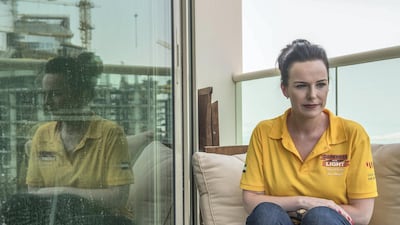Volunteer-led mental health services in the UAE are under serious threat due to lack of funding, with one of the nation’s largest facing closure.
More than 500 volunteers help out at the Darkness Into Light group, which has delivered mental health support in the UAE since 2015.
What began as a walk to raise mental health awareness in Abu Dhabi has expanded into a full-time community initiative within three years.
Maria Kelly, a former maths teacher, now dedicates all her time to the cause, but that work is under threat unless DIL gains significant financial support.
“We have had no sponsorship up to this point, so it has been amazing to see how much it has grown thanks to the volunteer support we have had,” said Ms Kelly, 31, from Ireland.
“Our passionate and committed volunteers have a platform to give back to their community.
“No one has ever said no when we’ve asked for help.
“The objective is to get government funding for a year to get us back on our feet and to give us time to secure official fundraising rights, so we can be self-sufficient.”
Volunteer counsellors give up four hours a month, unpaid, to those most in need.
Some are in crisis and battling suicidal thoughts, while others deal from day to day with anxiety or depression.
To achieve charitable status in the UAE, DIL needs to register as a non-government organisation with the Community Development Authority and have 20 Emiratis signed up as co-signatories.
Volunteers work across a variety of professions, from teams of counsellors to drivers, accountants and event managers.
Public goodwill has never been in short supply, Ms Kelly said.
“People want to help however they can,” she said.
“No one has ever said no when we’ve asked for help.
"There was a clamour for a suicide helpline when we first started and now we have three telephone lines to support people in crisis.
“We are inspired by the progress that has been made, but there is still room for improvement.
“We feel the biggest need is a face to face connection with a professional. People who come to us need guidance and support about what to do next.
“We want to signpost to services around the UAE.”
Ms Kelly and her colleagues aim to roll out a five-year suicide prevention strategy that will offer training in the UAE in this area for the first time.
In time, they hope by offering training to corporations, revenue will be generated to support future work of DIL.
Since the start of the pandemic, several government-backed helplines have been established to offer support for those in need.
In May, the Frontline Heroes Office and National Programme for Happiness and Wellbeing established a hotline, with services in Arabic and English available by dialling 800HOPE.
In the first four months, 30 specialists received more than 700 calls, many from people asking for help with fear and anxiety caused by the pandemic.
Since 2017, it has helped thousands of people, including residents and Emiratis alike.
Laura Brennan, one of the trained counsellors working with DIL, said clients require help with a multitude of issues, with demand soaring since the start of the pandemic.
“People will reach out for help with conditions including suicidal thoughts, depression, anxiety, family abuse, addictions, existential crises and bereavements,” said Ms Brennan, from Ireland.
“Counsellors can have a real impact on people either in person or via Zoom. It is about providing an accessible service for people,” she said.
“Some people prefer to speak to specialists online, both have a therapeutic effect.”
One of those to benefit from counselling is Didi, a 48-year-old architect in Abu Dhabi.
She has been diagnosed with post-traumatic stress disorder, anxiety and depression, for which cognitive behavioural therapy is an effective treatment.
“I had no confidence or hope,” she said.
“I have been with DIL for six weeks and been getting great therapy based on my experiences.
“They have brought me confidence and healing, they are very genuine and it is from the heart.
“I feel like I am in safe hands.”


